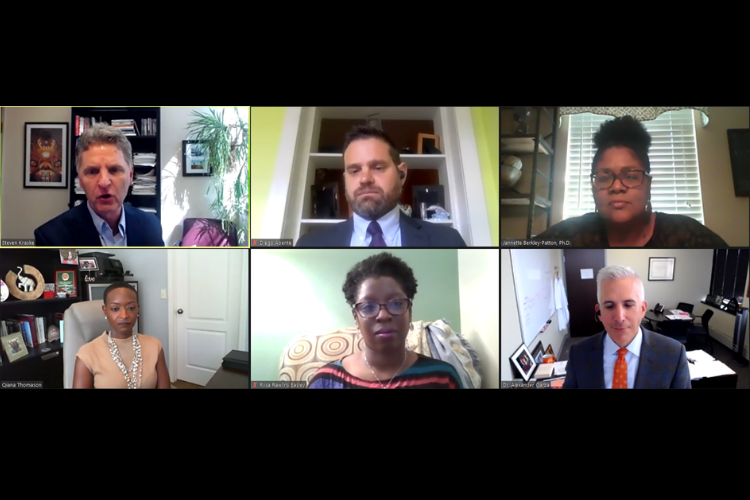UMKC kicked off its inaugural Engagement Month with UniverCities Exchange: Health Disparities in the Time of COVID-19, a panel discussion in collaboration with University of Missouri-St. Louis.
UMKC Engagement Month is a 31-day (virtual) celebration of all the ways our UMKC students, faculty, staff, alumni and friends contribute to the Kansas City community and beyond. The month overlaps with the University of Missouri System’s Engagement and Extension Week, held Oct. 26-30 and includes a variety of events.
The UniverCities Exchange: Health Disparities in the Time of COVID-19 discussion highlighted issues facing the urban communities of Kansas City and St. Louis and exacerbated by the pandemic. The event was moderated by Steve Kraske, host of KCUR’s “Up to Date.” Panelists included:
- Diego Abente, president and chief executive officer, Casa de Salud
- Jannette Berkley-Patton, director, UMKC Health Equity Institute
- Alexander Garza (B.S. '90), chief community health officer, SSM Health
- Riisa Rawlins-Easley, chief of staff, St. Louis Regional Health Commission
- Qiana Thomason, president and chief executive officer, Health Forward Foundation

Here are some highlights from the conversation.
“I would argue that it’s not so much health disparities, but social and economic disparities that contribute to or actually produce the health disparities. And if we want to come across a solution to the pandemic, we have to address these things first.” —Alexander Garza
“What underpins poverty is income and wealth inequality and structural racism. So knowing that, how do we calibrate our strategy and our positioning to go further upstream and address asset-building opportunities that build income and build wealth in communities?” —Qiana Thomason
“We need to recognize that we all play a role in addressing these inequities that have led to where we are today and that we all have a role and responsibility in addressing those moving forward. And so we need to give folks agency and empower them to help them feel like they are part of the solution.” —Diego Abente
“If we are going to really look, full in the face, and pivot — because this is our opportunity to pivot — from the systemic inequities that lead us to the disparate outcomes that we’ve seen 100 years ago and that are repeating themselves today, it’s only going to be through expanding that table and the conversation to the folks who are most impacted.” —Riisa Rawlins-Easley
“Medical mistrust [in Black and brown communities] is one of the key critical issues that has to be addressed. It’s not unfounded: studies show that, for people of color, many times they receive worse quality of health care, that they don’t believe they’re being respected by health providers, and there are other issues that come into play — like being able to access health care.” —Jannette Berkley-Patton
What the entire UniverCities Exchange discussion below.
